

The Infrastructure Needs of the Digital Economy. The Internet already plays an indispensable role in the everyday life of billions.
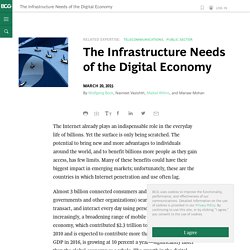
Yet the surface is only being scratched. The potential to bring new and more advantages to individuals around the world, and to benefit billions more people as they gain access, has few limits. Many of these benefits could have their biggest impact in emerging markets; unfortunately, these are the countries in which Internet penetration and use often lag. Almost 3 billion connected consumers and businesses (as well as governments and other organizations) search, shop, socialize, transact, and interact every day using personal computers and, increasingly, a broadening range of mobile devices.
The digital economy, which contributed $2.3 trillion to GDP in the G-20 in 2010 and is expected to contribute more than $4 trillion to their GDP in 2016, is growing at 10 percent a year—significantly faster than the global economy as a whole. Complex Challenges. Economic and Social Survey of Asia and the Pacific 2019: Ambitions beyond growth. The relatively stable economic performance of Asia and the Pacific conceals increasing downside risks to regional progress in implementing the 2030 Agenda for Sustainable Development.
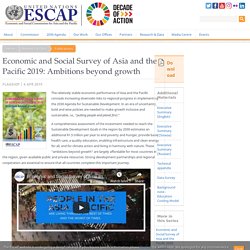
In an era of uncertainty, bold and wise policies are needed to make growth inclusive and sustainable, i.e., “putting people and planet first.” A comprehensive assessment of the investment needed to reach the Sustainable Development Goals in the region by 2030 estimates an additional $1.5 trillion per year to end poverty and hunger, provide basic health care, a quality education, enabling infrastructure and clean energy for all, and for climate action and living in harmony with nature. These “ambitions beyond growth” are largely affordable for most countries in the region, given available public and private resources.
Strong development partnerships and regional cooperation are essential to ensure that all countries complete this important journey. Chapter 1: Beyond economic growth Read Chapter 1 Related Blogs. The role of artificial intelligence in achieving the Sustainable Development Goals. Unlocking Technology for the Global Goals. Implementing the Sustainable Development Goals. The United Nations must get its new biodiversity targets right. Most measures of biodiversity suggest that things are going badly wrong.
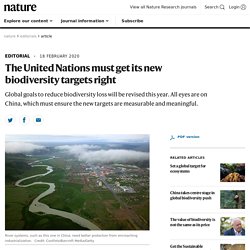
Some one million plant and animal species face extinction, according to the Intergovernmental Science-Policy Platform on Biodiversity and Ecosystem Services (IPBES). And French President Emmanuel Macron last week called the battle for biodiversity and climate change “the fight of the century”. A decade ago, countries united to create a 10-year plan, sub-divided into 20 targets, for protecting and conserving natural systems. Internet of Things declaration to achieve the sustainable development goals – IoT Week. Adopted by the participants of the Internet of Things Week 2017 on 9 June 2017 in Geneva Background The Internet of Things (IoT) is emerging as a powerful enabler in many application domains, such as water and energy management, environmental monitoring, health, smart cities, smart industry and supply chain management.
Could government buy into the vision of leveraging technology as much as possible towards enabling achieving UNSDs? – mattsmi123
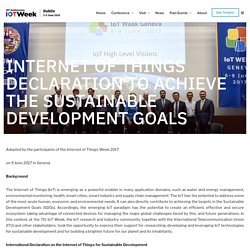
Brexit and UK Environmental Policy and Politics. BBC, 13 June 2018, [accessed 26 June 2018].
UK approach to environmental policy has been very European in nature. How will post Brexit policy differ and what will the costs of disentangling UK policy from EU policy be? "Whilst the Government has committed to the pursuit of a ‘Green Brexit’ there are on-going concerns that Brexit will lead to weaker environmental ambition and governance". Suggests likely to become quite fragmented accross the different member countries of the UK. – mattsmi123
Burns, Charlotte, The EU Referendum and the Environment, (London, Friends of the Earth, 2015), available at: Burns, Charlotte [and 13 others, The EU Referendum and the UK Environment: An Expert Review (2016), [accessed 2 July 2018].

Burns, Charlotte, Gravey, Viviane and Jordan, Andrew UK Environmental Policy Post-Brexit: A Risk Analysis (London, Friends of the Earth, 2018), available at: BusinessGreen, 28 March 2017 [accessed 26 June 2018]. BusinessGreen, 14 February 2018 [accessed 26 June 2018]. Matthew Smith Search Terms. Lindsay - search terms. EPRS STU(2019)624261 EN. Principles for protecting our digital environment. We may be getting tired of hearing it - but it is true that digitalization will change every aspect of our lives.

Medication that sends out information from inside our bodies, fully connected townhouses that autonomously regulate energy consumption, and robots that no longer assist us in our work, but make us their assistants: what seems like a dystopian horror scenario to some sounds like a bright new future to others. EPRS STU(2019)624262 EN. Job Loss From AI? There's More To Fear! 10. Gaps between environmental goals and the state of the environment are not unstudied in environmental research.
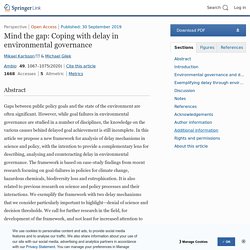
On the contrary, lack of goal achievement in public policy is researched since long in several disciplines. In natural and technical sciences, focus is placed on advancing the understanding of the problem at hand, thereby reducing uncertainty for decision-makers, and on engineering solutions of various kind. Regulating emerging technology. As emerging technologies drive new business and service models, governments must rapidly create, modify, and enforce regulations.
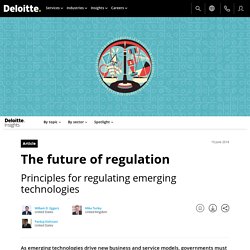
The preeminent issue is how to protect citizens and ensure fair markets while letting innovation and businesses flourish. Introduction Sweeping technological advancements are creating a sea change in today’s regulatory environment, posing significant challenges for regulators who strive to maintain a balance between fostering innovation, protecting consumers, and addressing the potential unintended consequences of disruption. Digital Transformation: Getting It Right, Zulfadhli Zulkifli.
'Policy makers should work together with organizations to understand the gap in talents and skills to ensure more effective and inclusive policies are in play, not only for businesses to operate in full digital but also to bridge that gap between business requirements and what the talents in the market can provide. A more inclusive policy can also be focused on bridging the talent gap between people of a different socioeconomical background. Providing that platform for less privileged individuals to understand DT on a fundamental level would further enrich the talent pool in the market.' – lindsaytodman
Roadmap for Digital Cooperation EN.
Could government buy into this to enable digital cooperation across industries in the sector – mattsmi123
The United Kingdom's Emerging Internet of Things (IoT) Policy Landscape by Leonie Tanczer, Irina Brass, Miles Elsden, Madeline Carr, Jason J Blackstock. Tanczer, L.
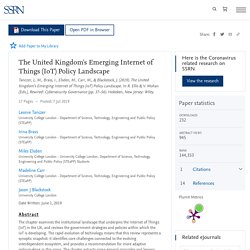
M., Brass, I., Elsden, M., Carr, M., & Blackstock, J. (2019). The United Kingdom’s Emerging Internet of Things (IoT) Policy Landscape. In R. Ellis & V. Mohan (Eds.), Rewired: Cybersecurity Governance (pp. 37–56). 17 Pages Posted: 7 Jul 2019. The Challenge of Collecting and Using Environmental Monitoring Data. Copyright © 2013 by the author(s).
Underlines the weaknesses of environmental monitoring systems unless they are performed by a dedicated government agency. What does the current and future landscape for that look like for the UK? – mattsmi123
Published here under license by The Resilience Alliance.
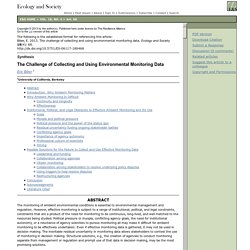
Go to the pdf version of this article The following is the established format for referencing this article: Biber, E. 2013. Press corner. Information based regulation. Editorial: Special Issue “Emerging Sensor Technology in Agriculture” Research and innovation activities in the area of sensor technology can accelerate the adoption of new and emerging digital tools in the agricultural sector by the implementation of precision farming practices such as remote sensing, operations, and real-time monitoring. The agricultural industry has been greatly affected by climate change; therefore, to be successful in overcoming these effects and remain competitive and sustainable in the market, there is the need to support research and application development of new and emerging sensor technologies and their applications in agriculture.
25 year environment plan.
Goal to develop soil health index Goal to monitor farms in a cost-effective way Monitoring indicators of landscapes character "Exploring options to consolidate monitoring and horizon-scanning work to develop an early warning system for identifying emerging chemical issues." "consistent and widespread monitoring to support identification of OA trends at a global level is required. The UK will continue to support this, and work with others to drive innovation in monitoring and collecting data to support policy and the activities of vulnerable ocean states. " "At present, we have well-developed systems that monitor many aspects of our environment but these will need to evolve to accommodate the needs of the Plan and a greater emphasis on using a natural capital approach. We will develop better measures in areas such as: soil health; how ecological systems are functioning; the human health benefits associated with a better environment; and the overseas impact of domestic consumption" "Both types of metrics will take advantage of rapidly-advancing new technologies. Remote sensing, environmental DNA (i.e. nuclear or mitochondrial DNA released from an organism into the environment) and ever-smarter mobile phones have the potential to revolutionise how we monitor changes in natural capital in ways currently technically impossible or prohibitively expensive. Satellite data, for example, can allow improved monitoring and enforcement in fisheries, or can record more accurately and with greater frequency how land is being used. Underwater vehicles (marine robots) will help us map and monitor Marine Conservation Zones." "Improve monitoring and evaluation of policies so that both costs and benefits can be more accurately estimated in future analysis" " The Kingsbrook project will be carried out over about a decade with a comprehensive monitoring programme, developed and overseen by RSPB scientists." – mattsmi123
Farming is changing – here’s what you need to know – August 2019 (web version) Farmers and land managers provide high-quality food while enhancing and protecting our countryside. From 1 January 2021 we can shape English agricultural policy so it supports both endeavours. This leaflet sets out our intended changes. To make sure there’s a gradual transition to the new system, we plan to make changes over a seven-year agricultural transition period. Development of Digital Identity Trust Framework confirmed. Cabinet has confirmed that a Digital Identity Trust Framework based in legislation will be developed.
Highlights how governments can establish a trust framework to increase the security of individuals and devices proving their identity over the internet: core to IoT and digital government services. – mattsmi123
The Trust Framework will be a regulatory regime that ensures that identity service providers meet the required rules. The Trust Framework will also ensure that citizens and businesses can have trust and confidence that their identity information is being handled appropriately. Developing an Interim Trust Framework. ODI Data Trusts A4 Report web version. India’s Real-Time Environmental Monitoring - Phase 2 - Jun 11 2020 - Sanjeev K. Kanchan, Independent Author, Environmentalist, Research & Advocacy professional, - Environmental Science News Articles - Envirotech Online. 7 Key Principles to Govern Digital Initiatives.
Already a member?
' Centralize information about digital initiatives rather than the initiatives themselves.' – lindsaytodman
Sign in.